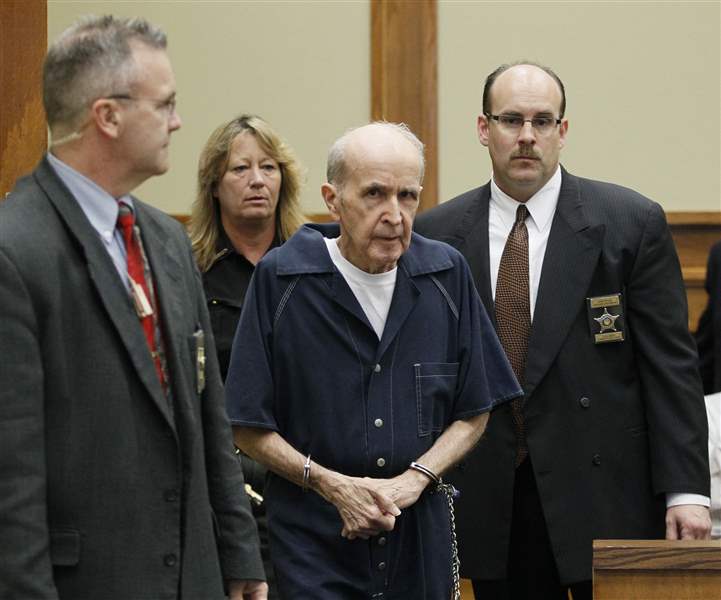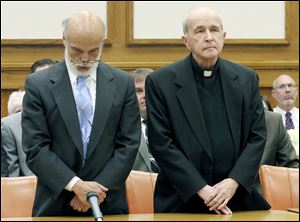
Robinson’s long appeals process allows him to be buried as priest
Diocese: No media access will be provided for the public funeral
7/8/2014
Gerald Robinson arrives for a hearing in Lucas County Common Pleas Court in Toledo, Friday, May 20, 2011.
The Blade
Buy This Image

Gerald Robinson arrives for a hearing in Lucas County Common Pleas Court in Toledo, Friday, May 20, 2011.
Gerald Robinson, 76, the Roman Catholic priest who died Friday in a prison hospice, will be buried after a public funeral to be held sometime this week, but details for it have not yet been announced.
Robinson remained a priest because the post-trial legal appeals process had not been completed but was barred from performing public ministry. He was serving a 15-years-to-life sentence after being arrested in 2004 and convicted in 2006 for the 1980 murder of Sister Margaret Ann Pahl of the Sisters of Mercy. The Rev. Charles Ritter, administrator of the Diocese of Toledo until a new bishop is appointed by Pope Francis, will preside at the funeral, church officials said Monday.
No media access will be provided for the funeral. The diocese cited a protocol it developed for situations when funerals are celebrated for priests removed from priestly ministry.
The Survivors Network for those Abused by Priests and the National Survivors Advocate Coalition wrote to Father Ritter in a letter dated Sunday requesting that the funeral be private and small, stating, “We hope Fr. Robinson’s passing brings some comfort to those he hurt and their loved ones. But any such comfort will be short lived as those struggling families learn that Fr. Robinson is being buried with full honors.”
13abc.com Toledo (OH) News, Weather and Sports
Speaking to The Blade, Claudia Vercellotti of SNAP said, “I think all you have is faith, and I’m still holding out faith” that leaders will cancel the honors given for a priest’s funeral and burial. Those honors can include the deceased being buried in the vestments used in celebrating Mass; since Robinson had been removed from priestly ministry, he likely had not worn those vestments since he was imprisoned.
Robinson being buried as a member of the clergy “is an abomination,” Ms. Vercellotti said. “It is minimizing of not only the life that Sister Margaret Ann Pahl led, but how she died.” She also noted that Robinson was the priest who presided at Sister Margaret Ann’s funeral.
Robinson’s removal from priestly ministry meant in part that he could not give sacraments to others, but he is said to have given pastoral care and advice to other prisoners. He was not listed as a priest in the directory of the Diocese of Toledo.
Once the appeals were exhausted, had the conviction stood, the diocese would have requested action from the Congregation for the Doctrine of the Faith in Rome to remove him from the priesthood, according to the diocese’s communications director, Sally Oberski.
Robinson’s death marks the end of his extended legal battle to clear his name.
After losing all of his appeals in state court, Robinson had turned to a federal court in early May where he asked a judge to overturn his conviction and release him from prison — a legal procedure known as a petition for writ of habeas corpus.

Gerald Robinson burial with full honors of a Catholic priest is called ‘an abomi-nation’ by Claudia Vercellotti of Survivors Network for those Abused by Priests.
Toledo attorney Rick Kerger, who filed the petition, had argued in the lengthy document that Robinson was the victim of an unjustified 24-year delay in charging him with Sister Margaret Ann’s murder, that he received ineffective legal assistance at trial, and that he was denied his right to due process because prosecutors did not disclose all of the evidence in the case.
Mr. Kerger said Monday that the petition is now moot, and he plans to ask the court to dismiss it.
“I truly thought this was where the battle would be won,” Mr. Kerger said. “It just took too long to get there.”
Staff writer Jennifer Feehan contributed to this report.
Contact TK Barger @ tkbarger@theblade.com, 419-724-6278 or on Twitter @TK_Barger.